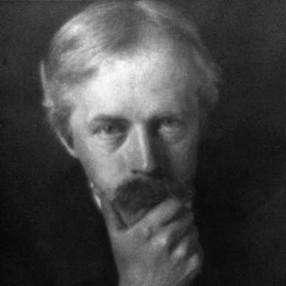The Crying of Water
O water, voice of my heart, crying in the sand,
All night long crying with a mournful cry,
As I lie and listen, and cannot understand
The voice of my heart in my side or the voice of the sea,
O water, crying for rest, is it I, is it I?
All night long the water is crying to me.
Unresting water, there shall never be rest
Till the last moon droop and the last tide fail,
And the fire of the end begin to burn in the west;
And the heart shall be weary and wonder and cry like the sea,
All life long crying without avail,
As the water all night long is crying to me.
This poem is in the public domain. Published in Poem-a-Day on December 10, 2023, by the Academy of American Poets.
“The Crying of the Water” appears in Arthur Symons’s collection The Loom of Dreams (Self-published, 1901). The poem later appeared in W. E. B. Du Bois’s book The Souls of Black Folk: Essays and Sketches (A. C. McClurg & Co., 1903) as an epigraph to the first chapter, “Of Our Spiritual Strivings.” In “Musical/Textual Double Consciousness in W. E. B. Du Bois’s The Souls of Black Folk,” published in Il Tolomeo, vol. 24 (December 2022), Adriano Elia, senior lecturer in English at Roma Tre University, writes, “[I]n the first chapter ‘Of Our Spiritual Strivings,’ Du Bois selects a bar of the melody of the celebrated spiritual ‘Nobody Knows the Trouble I’ve Seen,’ and combines it with the complete text of the poem ‘The Crying of Water’ by Welsh poet Arthur Symons. [. . .] In The Souls of Black Folk, the Judgment Day is not generally seen as an apocalypse, yet there are moments [. . .] in which catastrophic visions are invoked, and the same sombre [sic] feelings are aroused by the second section of Symons’s poem [. . .]. Here, the weeping sea symbolizes the speaker’s heart, the speaker is ‘weary’ and ‘wonder[s] and cries like the sea,’ thus evoking Du Bois’s statements that the African American race was in a time of conflict, ‘the time of Sturm und Drang: storm and stress today rocks our little boat on the mad waters of the world-sea.’ Symons’s poem ends with the speaker claiming that he will spend ‘All life long crying without avail,’ and likewise Du Bois’s first chapter conveys a pessimistic view of the struggle of African Americans, a view slightly mitigated by the choice of a hymn of salvation [. . .].”

